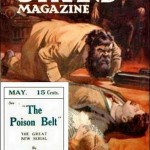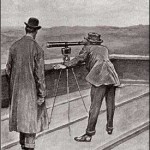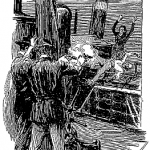“I acted for the best,” cried the old man, throwing his hands up with a piteous gesture. “You should be the last to upbraid me. It was the dream of leaving you rich and honoured which drove me on. I was prepared to do anything for that end.”
“You have always excellent intentions,” his son said callously.
“They have a queer way of showing themselves, however. Look out, here’s
Sampson!”
As he spoke they heard the crunching of the fisherman’s heavy boots on the shingle, and he looked in, with his ruddy face all shining with the salt water.
“We’re all ready now, sirs,” he said. “Jarge and I will get into our oil duds, and then we can lock up the shop. It’ll have to take care of itself until we come back.”
The two gentlemen walked down to the edge of the sea. There was a little dinghy there, and the boat was anchored a couple of hundred yards off. They could just make out the loom of her through the darkness, and see her shadowy spars, dipping, rising, and falling with the wash of the waves. To right and left spread the long white line of thundering foam, as though the ocean were some great beast of prey which was gnashing its glistening teeth at them. The gale had partially died away, but there still came fitful gusts from the south-west, and the thick clouds overhead were sweeping in a majestic procession across the sky, and falling like a dark cataract over the horizon, showing that up there at least there was no lull in the tempest. It was bitterly cold, and both men buttoned up their coats and slapped their hands against each other to preserve their warmth.
After some little delay, Sampson and his son came down from the hut with a lantern in each of their hands. They had locked the door behind them, which showed that they were ready for a final start. By the lights which they carried it could be seen that they were dressed in yellow suits of oilskin and sou’wester hats, as if prepared for a wet night.
“You ain’t half dressed for a cruise of this kind,” Sampson said.
“You’ll be nigh soaked through, I fear.”
“That’s our look-out,” answered Ezra. “Let us get off.”
“Step in, sir, and we’ll get in after.”
The dinghy was shoved off into the surf, and the two seamen clambered in after. Ezra and his father sat in the sheets, while the others rowed. The sea was running very high—so high that when the dinghy lay in the trough of a wave they could see neither the boat for which they were steering nor the shore which they had left—nothing indeed but the black line of hissing water above their heads. At times they would go up until they hung on the crest of a great roller and saw the dark valleys gaping beyond into which they were forthwith precipitated. Sometimes, when they were high upon a wave, the fishing-boat would be between the seas, and then there would be nothing of her visible except the upper portion of her mast. It was only a couple of hundred yards, but seemed a long journey to the shivering fugitives.
“Stand by with the boat-hook!” Sampson cried at last. The dark outline of the boat was looming immediately above them.
“All right, father.”
The dinghy was held alongside, and the two gentlemen scrambled aboard as best they could, followed by their companions.
“Have you the painter, Jarge?”
“Ay, ay.”





